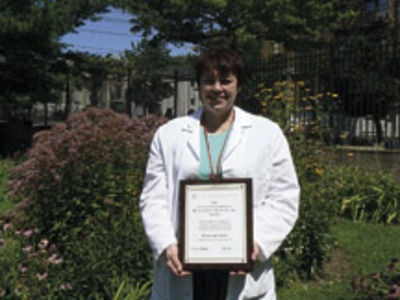A North Bergen nurse who works at a live-in AIDS rehabilitation center characterizes herself as shy, yet she never shies away from speaking to her patients.
Maggie Sosa’s dedication to patients living with AIDS is a large reason why Broadway House for Continuing Care in Newark, recommended her for the Healthcare Foundation of New Jersey’s 2009 Humanism in Healthcare Awards. Sosa received the award in July.
Sosa is the Director of Advanced Practice Nursing at New Jersey’s only sub-acute care facility for adults with the disease.
Sosa, who is originally from Jersey City, received her nursing diploma from Christ Hospital School of Nursing in 1979, received her BSN from New Jersey City University and her master’s degree as an Adult Nurse Practitioner from New York University.
She said that when she first started working at Christ Hospital, the AIDS epidemic had not yet happened and when the disease first began to emerge, it was thought to be something gay men or drug users got.
When AIDS did hit home, Sosa remembers seeing friends dying.
“I think it could have been me,” said Sosa. “I’m very lucky.”
She went on to home care and hospice visits in 1985, where she would treat victims who were dying and helped frightened family members cope and reconnect before their loved ones succumbed to the disease.
“I remember in the 80s we only had one funeral parlor in Jersey City that would embalm HIV patients,” said Sosa. “People were really, really frightened.”
Sosa went on to work at St. Mary’s Hospital in Hoboken and St. Vincent’s in New York City, where she helped set up HIV clinics at homeless shelters, before she came to Broadway House where she has worked for the last five and a half years.
“I need to constantly learn and progress and here it’s so fascinating,” said Sosa. “The patients all have wonderful, heartwarming, moving stories and we see a lot of joy here. It’s really about living each day.”
Day by day
Sosa said that in the 1980s after receiving an AIDS diagnosis most patients had a six month prognosis to live.
Broadway House was founded in 1995 and started as a hospice care center funded by UMDNJ because people needed a place to die.
However, when anti-viral drugs came onto the scene in the 90s people who were lying on their death beds experienced the “Lazareth syndrome” and began to walk. That is when Broadway House changed its mission to rehabilitation. Sixty-five percent of patients are now discharged from Broadway House.
Sosa said that around two patients pass away each month now, but said that even though death is present it is not a morbid atmosphere.
She explained that as a nurse, she is not only taking tests, but treating the whole person.
It’s also about giving people freedom. At Broadway House, patients have art therapy, occupational therapy, counseling and yoga.
“Healing isn’t about curing.” – Maggie Sosa
________
“Healing isn’t about curing, it’s about spiritually getting better and accepting whatever it is,” said Sosa. “Whether you are living or whether you are dying… healing the family so you can all come together and support each other.”
Memorable patient
Sosa said that one patient who sticks in her mind is Mark Linskey, a former businessman from Sparta, whose family turned to Broadway House in 1995 when they had no where else to go. The family hid his disease until it became too overwhelming to deal with.
Linskey passed away when his son Michael was only 14-years-old. He is now 18 and going to college on a scholarship. This year, Michael came to Broadway House to thank them for their support. He is hosting a 5K Walk/Run in his father’s memory on Aug. 15 in Sparta and funds raised will go to Broadway House.
“He said ‘my father was happy [here and] he got his life back,’ ” said Events and Special Programs Coordinator Debbie Fresinger.
Sosa said it was “beautiful” that he honored his father’s legacy.
Worrisome trend
One thing that worries Sosa is that AIDS is not talked about as much as it once was. She said that young adults still sometimes think that you can tell if someone has AIDS, or that it is only gotten by sleeping with unsavory people, yet they still receive young patients, said Sosa.
Sosa said that when “pretty” inhibitors came onto the drug market, AIDS side effects could be hidden and people could live a seemingly healthy life, but now more and more people might have a resistance to those drugs.
“We don’t see pictures of people dying from it anymore,” said Sosa.
She said that one recent patient did not respond to the one-a-day treatment, and must now take five pills a day for AIDS and other related issues.
“To have to be perfect and take your pills at the same time every day is not easy,” said Sosa.
Fresinger said that while Sosa says she spends an average 40 hours a week at Broadway House, she is there much more than that.
“My main goal each day is to just come to work and try to help as many people as possible,” said Sosa.
Tricia Tirella may be reached at TriciaT@hudsonreporter.com.
